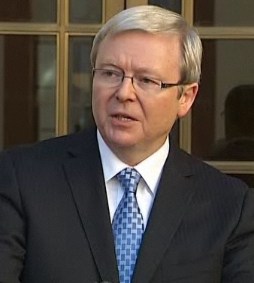Australia has taken the first step towards 100Mbps unlimited broadband service this weekend as an agreement was reached to decommission the country’s copper wire phone network, replacing it with fiber connections to 90 percent of Australian homes.
After months of heated negotiations between Telstra and the federal government, Telstra CEO David Thodey this morning joined Prime Minister Kevin Rudd at the podium to announce the $11 billion deal. Telstra will agree to scrap its copper-wire phone system and make way for the federal government’s new fiber network.
Rudd claimed the deal would benefit everyone because it would permanently retire an obsolete network with easily-upgradable fiber, connected right to the home. Under Rudd’s previously announced National Broadband Plan, the government would finance the construction of the fiber network and lease access to any provider, including Telstra, at wholesale pricing.
In addition to an $11 billion offer, Telstra is expected to keep the estimated $580 million the company could earn from recycling more than 70 million kilometers of copper phone wiring no longer needed. Another $1 billion will be earned from real estate sales. At least 3,000 telephone exchange offices are expected to be declared redundant after switching to the fiber network, bringing Telstra plenty of additional earnings as those properties are sold off.
“I can’t stress enough just how complex this certain negotiation has been, because we’ve had to look at commercial issues, what the future of the business would be, what the structure of the industry would be, but we have got to this position and we are pleased to have done so, because it does give us clarity, and that’s what this company needs,” Thodey said. “Firstly we’ve got to grow our share of the market, we’ve got to simplify this business to take the unnecessary complexity [out], and we are going to continue now to build and invest in building new products and services to work in an NBN world.”
The agreement gives NBN Company, the government-owned entity building the fiber network, access to Telstra’s outdoor facilities to house the fiber network, saving the government billions in construction costs. Telstra has also agreed to purchase wholesale access to the new network and will also decommission its coaxial cable-based systems, moving customers to the new fiber facilities as built.
 Telstra will continue to operate its wireless mobile network and satellite TV business independent of the government broadband project. For Telstra, in return for giving up control of broadband, the company is also freed from its universal phone service obligations which required it to provide service to any Australian that asked.
Telstra will continue to operate its wireless mobile network and satellite TV business independent of the government broadband project. For Telstra, in return for giving up control of broadband, the company is also freed from its universal phone service obligations which required it to provide service to any Australian that asked.
Telstra shareholders liked what they saw as the stock soared in value earlier this morning, but Thodey urged some caution.
“We believe that this is an important milestone towards getting [the deal done], but I want to stress it’s only a milestone, because it’s a non-binding financial heads of agreement that sets us on a road to get to a definitive agreement over the next period,” Thodey said.
[flv width=”512″ height=”308″]http://www.phillipdampier.com/video/Network 10 Aus Broadband Deal 6-21-10.flv[/flv]
Network 10 covered the deal between Telstra and the federal government in its weekend news report. (4 minutes)


 Subscribe
Subscribe
